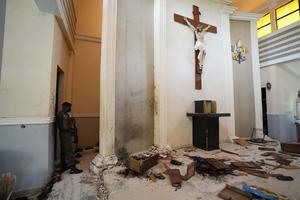Young Woman Who Escaped Boko Haram: ‘I Have a Dream of a Safe Nigeria’
Now safe in the U.S., she told Congress, ‘I dream and pray for freedom, safety and peace to win in Nigeria.’

WASHINGTON — “I have a dream of a safe Nigeria.” This is the hope voiced by one of the Nigerian schoolgirls who escaped captivity by the terror group Boko Haram, speaking before members of Congress on Capitol Hill on Wednesday.
“Sa’a,” was one of hundreds of Chibok schoolgirls abducted by the terrorist group Boko Haram on April 14, 2014. She testified Wednesday before the House Subcommittee on Africa, Global Health, Global Human Rights and International Organizations.
She said in her testimony that she dreamed of “a Nigeria where girls like me are not made into suicide bombers and little boys are not routinely stolen and turned into terrorists. A Nigeria where, (if) even the worst happens and children are stolen, every effort is made for their swift rescue, and those who can help, help, and those who can help can speak for those who cannot speak for themselves.”
Boko Haram, which means “Western education is sinful,” is a Nigerian Islamist militant group regarded as the deadliest terror group in the world. The group is responsible for attacks on villages, schools and churches in northern Nigeria, killing thousands of Christians and other Muslims in the last few years. After losing some of the land it controlled recently, the group has sent more children and girls on suicide bombing missions.
The group caused an international outcry in 2014 when it attacked a school in Chibok, Nigeria, and abducted 276 teenage girls. An international social-media campaign started with the hashtag #BringBackOurGirls trending on Twitter and Facebook.
Some 57 of the girls have escaped the group, but 219 of them are believed to still be in its custody. Last month, 15 of the girls appeared alive in a video identifying themselves, obtained by CNN and reportedly filmed in December.
Rep. Chris Smith, R-N.J., chair of the subcommittee, lamented the plight of the kidnapped girls.
“Many of these schoolgirls are believed to have been forced to convert to Islam and married to Boko Haram fighters or prostituted by this group,” he said. “We now receive reports that some of them may be used as suicide bombers.”
“Sa’a” recounted when Boko Haram attacked the Chibok school at night two years ago. “They were all shooting guns and yelling, ‘Allahu Akbar,’” she said. They burned the school and forced the captive girls into trucks.
“Sa’a” and her friend escaped by jumping out of the truck and hiding in the woods. Her friend suffered injuries to her legs and “couldn’t walk,” she said. Her friend told her to move on without her. “If we are going to die, we are going to die together. I’m not going to leave you here,” she responded.
Through the help of a Fulani herdsman, they eventually made their way back home. She now attends college in the United States.
At first, she balked at going back to school, even in another country. She told a friend, “I’m not coming to school because of what happened.” The Boko Haram attack was already the second school attack “Sa’a” had endured, and the captors had threatened the girls, saying that they should be married and not at school.
“I feel like if I go to school again, they will kidnap us wherever we are,” she thought at the time, but was encouraged by her brother and friends not to let the terror obstruct her further education. She started college in January through the Education Must Continue Initiative.
During her time in the U.S. “Sa’a” said she has visited the U.S. National Archives in Washington and saw the Declaration of Independence, the Constitution and a copy of the Magna Carta.
“I learned that the people who wrote those documents have faced hard times through the years, but they didn’t give up, and hope and freedom won,” she said. When she learned of Patrick Henry’s famous 1775 “Give me liberty or give me death” speech, she was inspired because “I realized that was exactly how I felt when I had to decide about jumping out of the truck to escape from Boko Haram.”
When the video of her missing schoolmates was made public, “Sa’a” said she “cried with tears of joy, thanking God for their lives. Seeing them has given me courage to tell the world that we should not lose hope.”
She is “always in touch” with her family back in Nigeria, as well as with some of her schoolmates who escaped Boko Haram.
“I dream and pray for freedom, safety and peace to win in Nigeria,” she concluded her testimony.
- Keywords:
- #bringbackourgirls
- boko haram
- congress
- nigeria

















